- Home
- Fredric Brown
The Far Cry Page 5
The Far Cry Read online
Page 5
Miss Evers testified further that Jenny Ames had told her that her fiancé was meeting her at the bus station in Taos and that she wanted Miss Evers to meet him when they got there. He had written her that he had arranged to reserve a room for her in a hotel in Taos; that he was taking her first to see his own place, where they'd live after they were married, then that he would bring her back to Taos for the night, as the marriage ceremony was arranged for the following day.
Jenny Ames had told her further that she had got to know Charles Nelson through a Lonely Hearts Club that advertised in a magazine, that they had corresponded for a while and then Nelson had come to visit her and had stayed a week in the city-or town-in which she lived, and that during that time they had fallen in love and become engaged, that he couldn't stay there because he was teaching in a Taos art school and was on brief vacation, that he had to return to his job, and that they had subsequently made the arrangement, by correspondence, for her to join him in Taos and marry him there—tomorrow.
When the bus had pulled in, Jenny Ames had introduced Miss Evers to Charles Nelson, who was waiting to greet her. But the couple had seemed—quite understandably—anxious to be alone together and Miss Evers had left them immediately after the introduction. She had already given Jenny Ames her Taos address and had asked her to use it after she was married and settled down. She had seen them get into Nelson’s car and drive away.
She was sure of the date because it had been a Sunday, the last day of her vacation, and the dates of her vacation were on record at the clothing store.
Dr. Alberto Gomez, the coroner, had next taken the stand. He testified that he had examined the body and that it was the body of a girl of about twenty—within two years one way or the other—about five feet four inches tall weighing (at time of death) probably about a hundred and ten pounds, fair complexion and black hair. It had been buried at least two months. Cause of death had been several knife wounds in the body, almost any one of which could have been fatal. They had been struck with a broad, single-edged knife at least eight inches long. Yes, a kitchen knife—if it was a moderately sharp one—could have been the weapon used.
No, neither Pepe Sanchez nor Carlotta Evers had been called upon to view the body; in its present state of decomposition neither could have been expected to make an identification from having seen the deceased once—and for seconds only, in Pepe's case—two months before. Positive identification would come only from dental records; even fingerprints were unobtainable at this stage. In answer to a question from a member of the jury—yes, the body had been fully clothed and there was no evidence of rape,
Sheriff Freeman was called again to the stand. He testified that he had made a note of the date of his call to Arroyo Seco to investigate the Sanchez boy’s story and that it was the same date that Miss Evers had given for her meeting of Jenny Ames and of Charles Nelson, May 17th. He testified that he had checked all hotels, rooming houses and tourist courts in or near Taos and that Charles Nelson had not—as Miss Evers had testified that Jenny Ames had told her—reserved a room for Jenny Ames for that night. Also that no application had been made by Nelson for a marriage license nor had he made arrangements with any local clergyman or civil official to have a marriage performed.
He stated that he had sent out descriptions of Charles Nelson to law-enforcement agencies all over the country and had been attempting to trace his movements after leaving the house beyond Seco, but thus far without success. It had not yet been possible to determine even the exact date of his departure, although it had probably been within a day or two, a few days at the outside, after the he had found no one either in Taos or Seco who had seen Nelson after he, Freeman, had seen him the morning after the murder. Perhaps it had been that interview—although Nelson had come through it without arousing suspicion—that had frightened him into leaving. Until then, Nelson would not have known that the Sanchez boy had seen—what he had seen.
Freeman testified further that he had had no greater success in tracing any of Nelson's movements before he had come to Taos, about six weeks before the murder. He had paid his rent for the house beyond Seco in cash and in advance and had given no references. If he had ever mentioned anything concerning his past to anyone in Taos, that person had not yet come forward—and the sheriff wished that he would.
Nor had Freeman been able to find where Jenny Ames had come from or any facts about her except what she had told Carlotta Evers. Inquiries were still being made—and the nation-wide publicity being given the case should bring reports from somewhere, soon.
The coroner's jury had been out twelve minutes and had brought in a verdict of willful murder.
Weaver made his final notation and then turned to the front page of the following issue. The only story was a statement by the sheriff that the inquiry into the murder of Jenny Ames was being continued and that a lead to the whereabouts of Charles Nelson had been obtained.
In the next issue there was nothing.
He left the volume open on the counter and turned around to Callahan's desk, waited till the editor looked up.
"Anything further after that one issue?"
"Not a thing, Mr. Weaver. The story died on its feet after the inquest. They never did find out where Jenny Ames came from nor where Nelson came from or went to.”
"What was the lead on Nelson the sheriff thought he had the following week?"
"Damn if I even remember. Whatever it was, it petered out."
Weaver closed the bound volume and stood looking at it a moment. He stood there long enough to light a cigarette and then turned back to the editor’s desk.
"Thanks a lot," he said. “I'd like to buy you a drink; can you knock off long enough?"
Callahan glanced at his watch. "Shouldn't. But I will.” They went around the corner to El Patio and found a table and ordered drinks. Callahan turned to watch the Spanish-American girl who had taken their order go back indoors toward the bar. "Jail-bait,” he said. "When those Spanish gals look eighteen, they're probably fourteen." He sighed. "Well, it’s fun to window-shop. Say, I hear someone has taken the place Nelson lived in. Is it you? Is that part of your interest in the case?"
"I'm the one who took it. But I wouldn’t be interested just for that reason; I told you the truth about why I'm looking it up. By the way, didn't the girl have any luggage?"
"Yes, she got off the bus with two suitcases and Nelson put them in his car. But they weren't found; he must have taken them with him when he left."
Weaver frowned. "A funny case. Especially in that they never traced the girl back farther than they did. Of course it was a pretty cold trail by that time, but even so—”
He broke off as their drinks came. Callahan’s eyes followed the girl back to the door again, and then he turned back. "That part of it was strange, all right. The Case got fairly wide publicity and you’d think someone who knew the girl would have read about the murder—or that she’d have been reported missing wherever she came from.” The editor shrugged. "But she may have come from some one-horse town where nobody happened to read about it. "T'hat's what most of us figured."
Weaver suggested, "Or possibly the woman who talked to her on the bus got the name wrong. I mean, it might have been Jenny Haines or Jenny James or something like that."
"No, it was Ames all right. She signed it—Oh, that's one thing that did come up later, after what you read. They did trace her as far as Albuquerque; she stayed at a hotel there the night before the murder. She registered there as Jenny Ames."
"They never found the Lonely Hearts agency through which Nelson got into correspondence with her?"
Callahan shook his head. "That angle was tried—and Uncle Sammy’s boys did the asking because the U. S. mails would have been involved. But no dice; those outfits don’t keep records of individual correspondents, once they've turned them over to other correspondents and collected their fee. I suppose they’d have to have warehouses full of files if they did. Well, I’m afraid I’d better push ba
ck to the office—still have some work to do for today."
"Sure you won't have another drink?"
“I’ll take a rain check. Thanks.” Callahan pushed back his chair and stood.
Weaver said, "Wait a minute. I just had a thought that’s so ridiculously simple someone else must have had it eight years ago, but I don’t see the catch in it. You say she signed the register in an Albuquerque hotel. There’s always a blank where you put down where you came from; didn’t Jenny Ames fill it out?"
"She filled it out, but she put down 'Taos, N. M.' She planned to marry here and stay here so she must have figured this was her real address." Callahan smiled grimly. "Well-she stayed here all right."
Chapter Four
Night again, pressing against the windowpanes. Silence except for the far wild yapping of the Coyotes.
And Weaver, sober tonight—although he was sipping a little wine as he tried to read—found the night and the silence, for the first time, just a bit frightening.
You see, other evenings here he’d been alone. Tonight—not quite. Jenny Ames was there, somehow. Today, when he had learned the little about her that there was to be known, she’d come alive for him. Yesterday she’d been a name,
Tonight her presence was in the room, in his mind. She was the more vivid to him because he knew so little about her. A photograph, had one existed, would have spoiled the illusion—but there was no photograph, only vague description with which his imagination could do as it willed. A pretty girl, young, with black hair, who had loved—or thought she loved—a monster and who had come to marry him.
Out of mystery she had come. And into deeper mystery, the ultimate mystery, she had gone. And she had been in this very room, perhaps sat in this very chair, during the few hours that had elapsed between her arrival here and her leaving—into the final darkness.
Never to return. Never to answer the questions left behind her.
Where did you come from, Jenny? Why did no one trace you here? Did no one love you, care about you, in the place from which you came? What had life and people done to you, Jenny, that had made you so desperate as to write to a Lonely Hearts Club, to meet and love a murderer?
What made you love him, Jenny? What wiles did he use on you, that time he visited the town you lived in? How did he make you love him so?
So many questions left behind you.
Why did he kill you, Jenny? Because he was mad and for that reason only? Or was there gain for him somehow, and method in his madness? And did you know, before you died, why you died?
Did you have time to think, in those awful minutes after you saw the knife and before you felt it, time to wonder, time to realize that he had planned it all?
And he had planned it, Jenny. No room had been taken for you, no arrangements for a wedding made. He brought you here to kill you. But why?
Those damned coyotes, he thought. No, they weren’t new to him. In the years he’d lived in Santa Fe he’d heard them often—never, of course, from his quarters in town, but whenever he’d driven out of town and into wild country. Often at night he'd stopped his car along a road and shut off the engine and the lights to sit there listening, enjoying—or was it enjoying?—the wild loneliness of that sound, the primitive unanswerable yearning in it.
Tonight it was getting on his nerves.
Did you ever hear that sound, Jenny? Possibly not, for it was soon after darkness fell that you died, and perhaps they had not yet started their nightly lament against the wailing wall of the sky. Or had they started, back there in the hills? Did you run toward that sound as toward a lesser evil?
He poured himself more wine and thought nuts; he’d be going crazy himself if he let himself keep thinking like that. He’d found out, now, all there was to be found out about Jenny Ames and he’d better write it up from his notes and send it to Luke so it would be off his mind. Should he rent a typewriter in Taos tomorrow instead of waiting till Vi came with his portable?
But something told him he wouldn’t get it off his mind that easily.
Was it just because he lived here where it had happened? Well, that was part of it, but it was more than that. This interest in Jenny Ames—was it because, when he'd started this, he’d been interested in nothing and therefore what might have otherwise been a normal interest had become a compelling one? Yes, that could be it.
But it was more than that.
Why? Was it something within himself? An aftermath of his breakdown, his—face it—his teetering on the brink of madness those weeks in the san, that now was going to give him an obsession with an eight-year-old crime, a girl eight years dead? Was his interest psychopathic, abnormal?
Or was it, after all, just a normal interest, accentuated a bit perhaps by his lack of interest in other things? Wasn't the mystery of the crime—and of its victim and its motive—sufficient to interest anyone? The fact that Jenny hadn’t been traced, that almost nothing was known about her, where she had come from and what she had been—why hadn’t those simple things come to light?
Nelson—that was different; it’s understandable why a killer’s past and his movements after he has successfully committed a crime are going to be hard to learn. Especially the latter, when he has a two months’ start before the fact that he has killed is known. And if, as seemed probable, he had planned to kill even before he came here, obviously the name he gave was false and he would have said nothing, left no clue, through which his true identity and his antecedents could be learned.
But Jenny.
Did you have a secret, Jenny?
He swore at himself and tried to stop thinking about it.
He tried again to read and he couldn't concentrate on the book at all. And it was only nine o'clock; he couldn’t possibly go to sleep after having slept so late that morning.
He’d have to get himself something to do or try to do evenings besides reading. God, even a deck of cards to play solitaire. Or maybe he should try to write; he'd wanted to write a novel once, but that had been a long time ago and the vague idea he’d had seemed silly now. God, no wonder; that had been in his late teens, twenty years ago.
No, he'd never write that novel now, or any other. But shorter things, perhaps? He wished again that he’d brought his typewriter. Maybe factual things would be easy to write. He wondered if a job like Luke’s—digging up facts on past or recent crimes—would be interesting. Well, he was having a chance to find out if he could do writing like that, if he wanted to try his hand at it. Maybe he should write the article about Jenny Ames himself. Not try to sell it himself, of course; that wouldn't be fair to Luke because the whole thing had been Luke’s idea. But possibly instead of sending Luke merely notes to work from he should surprise him by sending him the story ready written. His style and approach might be way off the beam—at least unless he studied some fact detective magazines first to familiarize himself with them—but that wouldn't matter; Luke could rewrite it. But even if Luke submitted it as originally written, he'd rather have Luke use his own by-line and they could split even on the deal, because it would be Luke’s by-line that would sell the story and make it get Luke’s rates instead of beginner's rates. Or should he—? No, real estate was his racket, not writing. This one story and never tackle another.
He tried to read again and found, after a while, that again he'd been reading the same paragraph over and over and still didn't know what it said.
He put down the book and took another sip of wine. It was sweet wine and he’d found it particularly good for solitary drinking such as this. He could go through all the motions of drinking and feel the effect, eventually even get a bit drunk, but not with the devastating completeness of whisky. And never whisky and wine both; that's what had got him last night. Wine alone made him merely mellow and fuzzy around the edges, and it was sometimes nice to be fuzzy around the edges.
But, whisky or wine, he had been drinking a lot since he'd come here.
All right, damn it, he thought; you've been bored stiff most of the
time and you might as well admit it. The mountains are God damn beautiful but you can't look at mountains all the time; the air is wonderful, but breathing isn't enough. And you can't read and you can't paint and—
He was staring at the door and tried, suddenly, to wrench his mind away from the thing it was trying to picture there.
And then he thought, why? Why should I?
So the doctor told you to get interested in something, and you've found something that interests you and you keep fighting to keep your mind away from it. Anything except making money, the doctor said, and this makes money only slightly and incidentally; you’ve already got enough data to send Luke, if that’s as far as your interest went.
So maybe your interest verges on the psychopathic, but if you don’t get interested in something, you ’ll go crazy anyway, so—
He felt better, lots better.
He looked at the kitchen door and let himself think. He remembered the angle of vision he'd had from the outside, when he'd stood where Pepe Sanchez had stood, and tried to visualize and place the figures as they’d stood when Pepe had first seen them. Let's see—the table had been moved—but when he’d first seen the place it had been about three feet farther from the door. He moved it back and—yes, that was better. Nelson would have been standing beside the table when Pepe first saw him, probably just having taken the knife from its drawer. And Jenny there, in line between the window and the back door, moving backwards toward the door.
Weaver went to the back door and opened it, staring out into the moonless dark. For the moment, the Coyotes were silent; the whole night was completely silent, utterly without sound.

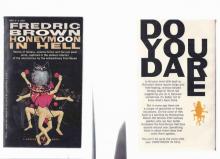 Hall of Mirrors
Hall of Mirrors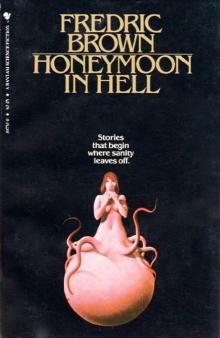 Honeymoon in Hell
Honeymoon in Hell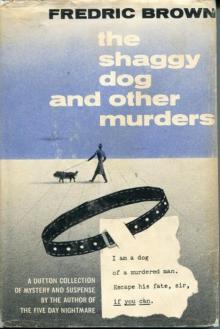 The Shaggy Dog and Other Murders
The Shaggy Dog and Other Murders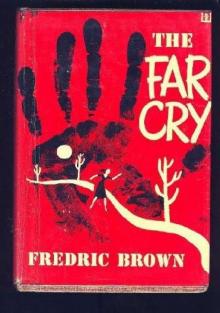 The Far Cry
The Far Cry Arena
Arena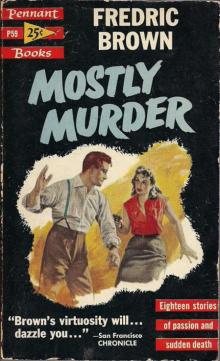 Mostly Murder
Mostly Murder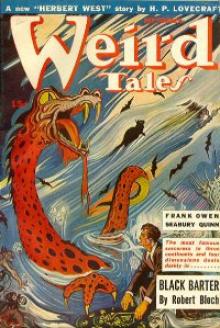 The Geezenstacks
The Geezenstacks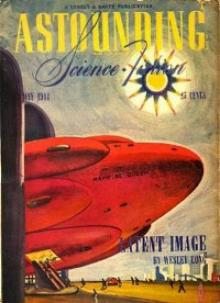 The Yehudi Principle
The Yehudi Principle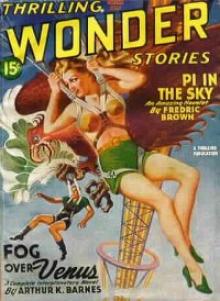 Pi in the Sky
Pi in the Sky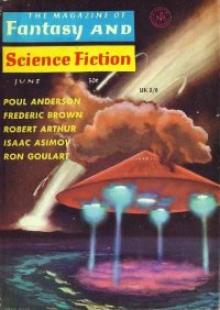 Eine Kleine Nachtmusik
Eine Kleine Nachtmusik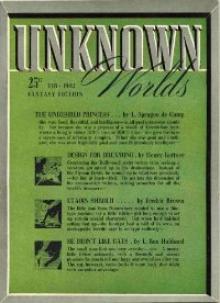 Etaoin Shrdlu
Etaoin Shrdlu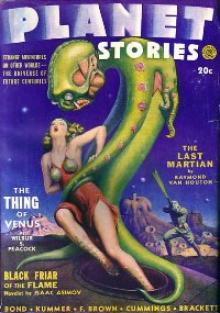 The Star Mouse
The Star Mouse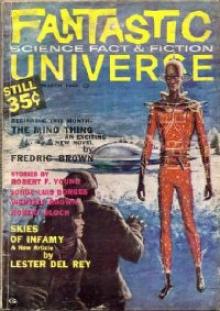 The Mind Thing
The Mind Thing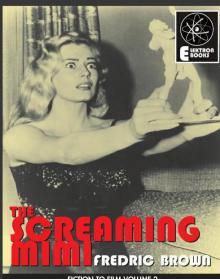 The Screaming Mimi
The Screaming Mimi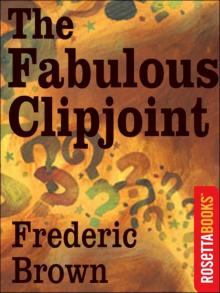 The Fabulous Clipjoint
The Fabulous Clipjoint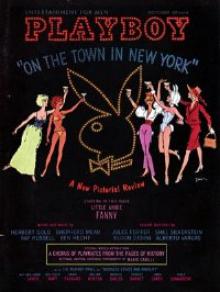 Puppet Show
Puppet Show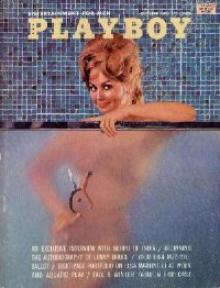 It Didn't Happen
It Didn't Happen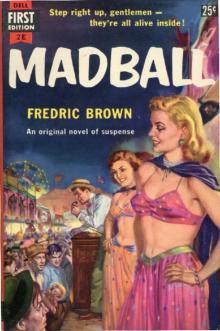 Madball
Madball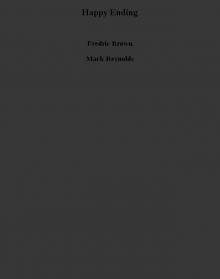 Happy Ending
Happy Ending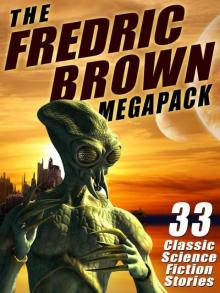 The Fredric Brown Megapack: 33 Classic Science Fiction Stories
The Fredric Brown Megapack: 33 Classic Science Fiction Stories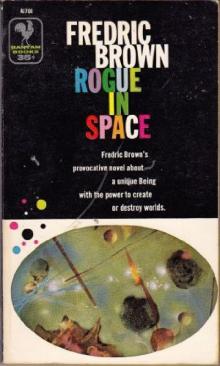 Rogue in Space
Rogue in Space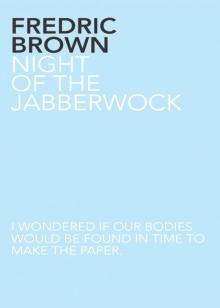 Night of the Jabberwock
Night of the Jabberwock The Dead Ringer
The Dead Ringer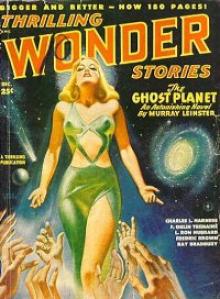 Knock
Knock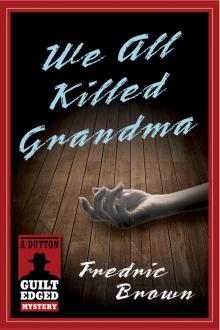 We All Killed Grandma
We All Killed Grandma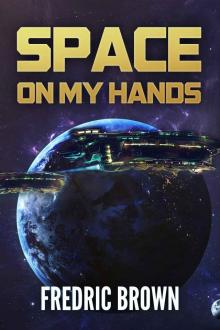 Space On My Hands
Space On My Hands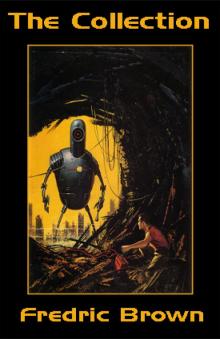 The Collection
The Collection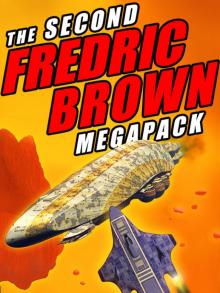 The Second Fredric Brown Megapack: 27 Classic Science Fiction Stories
The Second Fredric Brown Megapack: 27 Classic Science Fiction Stories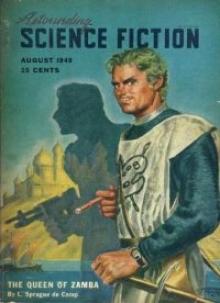 Letter to a Phoenix
Letter to a Phoenix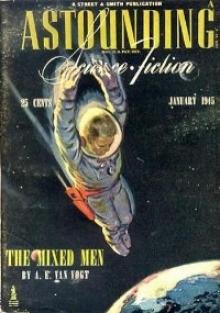 The Waveries
The Waveries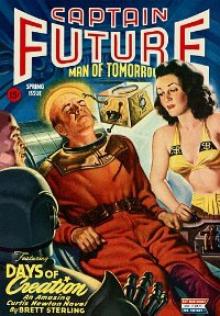 Nothing Sirius
Nothing Sirius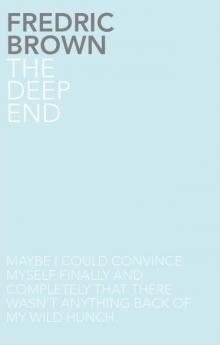 The Deep End
The Deep End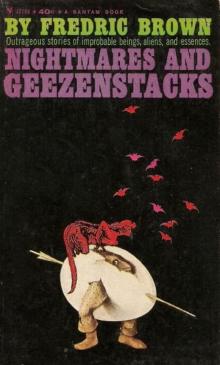 Nightmares & Geezenstacks
Nightmares & Geezenstacks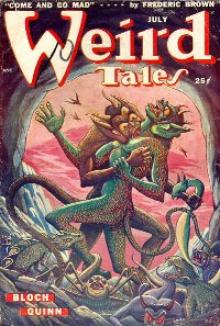 Come and Go Mad
Come and Go Mad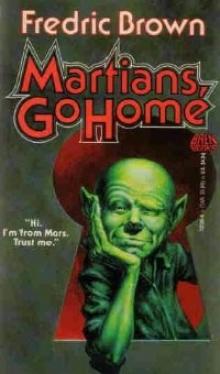 Martians, Go Home
Martians, Go Home